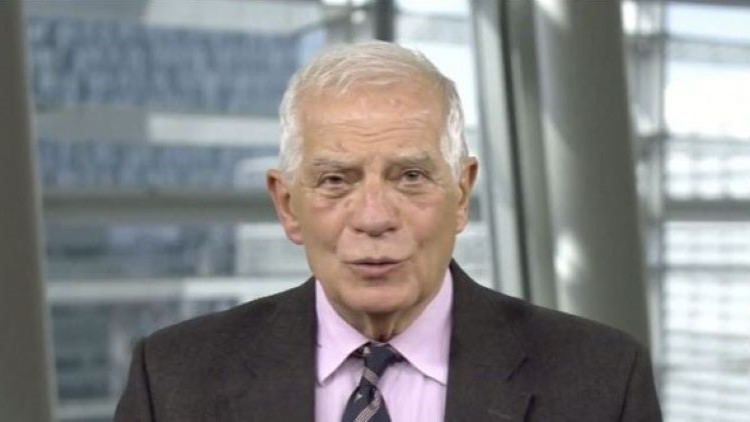Eduardo González
The High Representative of the European Union for Foreign Affairs and Security Policy and Vice President of the European Commission, Josep Borrell, warned yesterday of the need to deepen ties between the EU and Latin America (“the other transatlantic relationship”) because European strategic autonomy requires “reliable partners” and, in this sense, the Ibero-American region may be the most appropriate partner “for a shared agenda of social cohesion and renewal of democracy.”
“From the beginning of my mandate I have insisted on the need to deepen the ties between the EU and Latin America and the Caribbean, or, as I like to call it, the other transatlantic relationship,” Borrell declared during his participation, in virtual format, in the inauguration of the international seminar Spain, the European Union and Latin America: a renewed cooperation for sustainable development, organized by the Carolina Foundation and the ICO Foundation at the Casa de America in Madrid.
To achieve that goal, he continued, “this year is key” thanks to the celebration, during the upcoming Spanish Presidency of the EU, of the first EU-CELAC Summit since 2015 (“after too many years”) and because the region is facing, like the rest of the world, the consequences of “two unscheduled crises”: the COVID pandemic and the war in Ukraine.
However, he warned, it is necessary to “go beyond everyday crises.” “The will to strengthen autonomy exists on both sides of the Atlantic, Latin America and the Caribbean want to be Latin America and the Caribbean and we Europeans want to be what we are and defend our way of being autonomous,” but “autonomy means cooperation, it does not mean isolation, autonomy is not autarchy, and to be autonomous you have to have reliable partners for the three challenges that will mark this century: climate change, technological revolution and social cohesion,” he said. In this context, he said, “Latin America is much more than an economic partner and a market of growing importance”, it is “a partner for a shared agenda of social cohesion and renewal of democracy”. “Crucial interests for the EU for the coming decades are at stake in that region,” Borrell warned.
“We always say that Latin America and the EU are firm defenders of multilateralism, but we cannot make amends in the region and approach Latin America from Europe only when we need its votes, when issues of transcendental importance for us Europeans are debated in the United Nations and we ask for the support of Latin Americans,” said Borrell. Latin America is “a young continent seeking its own space and its own voice in a world of giants” and, therefore, the EU and Latin America must “work together every day” and contribute to reforming the current multilateral order, in order to “adapt it to the new geopolitical context” and to a distribution of power and wealth “radically different” from that which existed in 1945, when “the current multilateral institutions” came into being, he concluded.
Pilar Cancela: “Brazil demonstrates the need for a new social pact”
At the same event, the State Secretary for International Cooperation, Pilar Cancela, affirmed that “Spain must continue to be an essential actor and a true bridge in the bi-regional relationship between the European Union and Latin America and the Caribbean”, because this relationship “has faced in recent years a transformed international scenario” and the increase of “tensions in each of the two regions”. What happened in Brazil, she said, is “an example of the need” to “generate a social pact to which all democracies are summoned, especially those in Europe and Latin America”.
For this reason, she continued, the Spanish Presidency must “assert the global validity, more than ever, of the principles of democracy and the rule of law in the face of illiberal threats in Latin America and within the EU”. “From the Spanish Cooperation we accompany partner countries to achieve new models of governance that are more open and comprehensive and strengthen the capacity of institutions to provide quality public policies and thus establish a new social contract. In short, sustainable development for future generations,” she added.
For his part, the president of the Official Credit Institute (ICO), José Carlos García de Quevedo Ruiz, also highlighted “Spain’s position as a bridge between the two regions, a role that will become even more important during the second half of 2023, when Spain will hold the presidency of the Council of the EU. Likewise, the director of the Carolina Foundation, José Antonio Sanahuja, warned of the need to “rethink” relations between Latin America and the Caribbean and the European Union “at a particularly complex time, in which Latin America has a new lost decade behind it, and war has returned to the global stage, with new challenges for the social, technological and environmental challenges facing both regions”.
During the seminar, which concludes today, specialists from academia and international organizations, policy makers and representatives of business and civil society will address four main themes: the implications of the growing geopolitical rivalry and the war in Ukraine for the EU and Latin America and their mutual political dialogue, the development policies that both regions are adopting for recovery and just transition, the challenges of the ecological transition and energy matrix being addressed by Latin America and the EU, and the development cooperation policies of Spain and the EU and the “development in transition” approach as elements that can also underpin a broad renewal of the bi-regional relationship.





